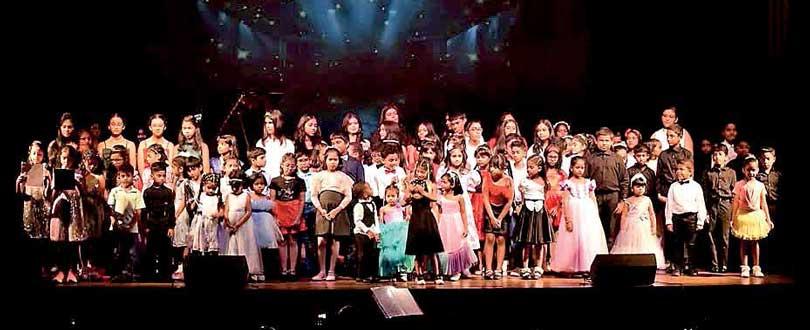


In 2022, Nadine Samarasinghe Pathmaraj quietly made history. As the first Sri Lankan to be awarded a Fellowship in Classical Singing from the London College of Music, University of West London, she placed herself and Sri Lanka on a global map that had long overlooked the voices rising from small islands. But for Nadine, that milestone was merely the beginning.
Now, in 2025, she continues to build on that moment with the same grace and determination that have long defined her journey, juggling the quiet rhythm of a life immersed in music, shaped by long nights of study, hours spent with students, and the delicate balancing act of motherhood, performance, and leadership.
At the center of this life is Nadine’s Academy of Music. What started as a modest studio offering classical vocal and piano lessons has evolved into a performing arts school, complete with guitar, music theory, and a vibrant choral program. Her students now sit for London board exams, and some are even releasing their own music and performing internationally, carrying Nadine’s influence far beyond the classroom. Yet Nadine herself hasn’t stepped away from the stage. Since earning her Fellowship, she has ventured into bold creative territory, blending classical technique with pop influences to create genre-defying music that challenges the boundaries of tradition. One of her most talked-about pieces is an experimental track that layers an operatic soprano line over a synth-heavy beat, a striking sonic metaphor for her ability to live in two musical worlds at once.
“People used to ask me what I preferred more, opera or pop,” she says. “Now I just say: I prefer the truth in each.”
Beyond performance, Nadine is also becoming an influential voice in arts education advocacy. She speaks at schools, collaborates with fellow educators, and champions the belief that music is not a luxury or an extracurricular pursuit but an essential part of every child’s education. And yet, for all her accolades, her greatest joy still lies in the small things: the moment a nervous student finally gets it right, the swell of a choir breathing together in harmony, or the quiet stillness before a performance begins. Three years ago, she called music “pure enjoyment and bliss.” Today, that feeling has matured. Music is now also about purpose, about transformation, about healing. Nadine Samarasinghe Pathmaraj is not just a vocalist or a teacher. She is someone quietly rewriting the score for herself, for her students, and, perhaps, for an entire nation.
In Conversation with Nadine
Founder of Nadine’s Academy of Music, Classical Vocalist and Music Educator
Q You started piano at age four and soon added violin and singing. Was there a defining moment in your childhood that convinced you music was your destiny?
Yes, at the age of six or seven I had my first public performance when I won an all-island prize for piano. That moment, standing on stage, made me realize that music was definitely what I wanted to do.
Q Your mother was a music teacher. How did her mentorship influence your artistic and teaching philosophies?
My mother was my first music teacher and she’s the one who gave me a solid foundation in my music education. I learnt from her the importance of learning the subject with proper technique and consistency. Those are principles I still use with my students.
Q You earned both an LTCL and a Fellowship in Classical Singing. How did each qualification elevate your craft?
Studying for the Fellowship and LTCL involved a lot of intense work and I gained so much knowledge in the process. That’s given me a great advantage when sharing that learning with my students across many levels.
Q Between classical training and pop performance, how do you balance authenticity in both genres?
Singing in both styles is all about using different techniques. Once you master the relevant techniques, it’s really not that difficult to balance it out.
Q Nadine’s Academy of Music recently celebrated a decade, and students are winning medals internationally. What teaching methods or values drive this success?
Teaching methods differ from student to student. Everyone’s needs are different. But our main goal is always to deliver a strong performance, paying attention to every little detail. I think that’s what leads to great results.
Q Any upcoming originals or albums on the horizon?
I’m hoping to release some new music in the near future, though I haven’t had the time lately because I’ve been so busy with the academy.
Q Could you walk us through your creative process, from song concept to final performance?
Firstly, if I’m given the choice to perform a song, I’ll choose something that speaks to me, so I can connect with it emotionally. Once the basics are done, I focus on the choreography and visual side of the performance.
Q You’ve shared cooking and fashion as passions. How do these hobbies intersect with your life as an artist and educator?
Well, cooking just relaxes me. And fashion is something I’ve had a passion for since I was a kid.
Q Managing a high-profile music career, running an academy, and personal wellness, what’s your self-care routine?
It’s definitely challenging to juggle everything. Fitness is very important to me, so I make sure to dedicate at least 30 minutes a day to exercise. That’s my number one self-care routine. It helps me both mentally and physically.
Q As Sri Lanka’s first Fellow in Classical Singing, what do you think is needed to elevate classical music education nationally?
We need to work on building strong vocal technique. That’s the key.
Q For aspiring musicians with big dreams but limited resources, what are three pieces of advice you’d offer?
- Always give 100 percent
- Never give up on your dream
- Keep working hard
Q Looking ahead, where would you like Nadine’s Academy to be in another 10 years?
My goal would be to open a few branches and eventually expand outside Sri Lanka as well.
Q How do you hope your work both as a performer and teacher helps reshape Sri Lankan music on the global stage?
I believe in giving the younger generation a solid music education with proper techniques and skills so they can compete internationally and succeed. I think that’s how we begin to reshape Sri Lankan music on the global stage.











